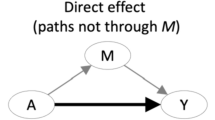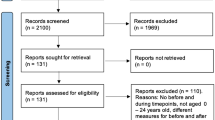Abstract
Early childhood intervention programmes have emerged in recent years with the aim of fostering the cognitive and social-emotional functioning and physical health of preschool children and enhancing their emerging competencies. This article presents a structured critical appraisal of economic evaluations of early childhood intervention programmes. It highlights a range of methodological issues in the field. These include: the fidelity of the evaluation process; the selection of the appropriate comparison group given the complexity of care routinely provided; the appropriate perspective and coverage of the study; methodological concerns relating to cost and benefit measurement and valuation; analytical requirements relating to the form of sensitivity analysis and the decision rules adopted by decision makers; and the interpretation of the results in the light of contextual factors. It is concluded that more transparent methodological guidance is required for analysts conducting economic evaluations of early childhood intervention programmes in particular and of public health interventions in general. Greater multidisciplinary collaboration between social scientists should also enhance the development of ground-breaking methods in this field.
Similar content being viewed by others
References
Halfon N, Hochstein M. Life course health development: an integrated framework for developing health, policy, and research. Milbank Q 2002; 80: 433–79
Vanlandeghem K, Curgins D, Abrams M. Reasons and strategies for strengthening childhood development services in the healthcare system. Portland (ME): National Academy for State Health Policy, 2002
Hertzman C, Wiens M. Child development and long-term outcomes: a population health perspective and summary of successful interventions. Soc Sci Med 1996; 43: 1083–95
Guralnick MJ. Second-generation research in the field of early intervention. Baltimore (MD): Paul H. Brookes Publishing Co. Inc., 1997
Zigler EF, Finn-Stevenson M, Hall NW. The first three years and beyond: brain development and social policy. New Haven (CT): Yale University Press, 2002
Zigler EF, Styfco SJ. Head Start and beyond: a national plan for extended childhood intervention. New Haven (CT): Yale University Press, 1993
Olds DL, Henderson Jr CR, Kitzman HJ, et al. Prenatal and infancy home visitation by nurses: recent findings. Future Child 1999; 9: 44–65
Schweinhart LJ, Barnes HV, Weikart DP. Significant benefits: the High/Scope Perry Preschool study through age 27. In: Monographs of the High/Scope Educational Research Foundation, 10. Ypsilanti (MI): High/Scope Press, 1993
Campbell FA, Ramey CT, Pungello E, et al. Early childhood education: young adult outcomes from the Abecedarian Project. Appl Dev Sci 2002; 6: 42–57
Reynolds AJ, Temple JA, Robertson DL, et al. Long-term effects of an early childhood intervention on educational achievement and juvenile arrest: a 15-year follow-up of low-income children in public schools. JAMA 2001; 285: 2339–46
Goodson BD, Layzar JI, St Pierre RG, et al. Effectiveness of a comprehensive, five-year family support program for low-income families: findings from the Comprehensive Child Development Program. Early Child Res Q 2000; 15: 5–39
Sure Start Unit. Sure Start. A guide for third-wave programmes. London: Sure Start Unit, 2000
Kagitcibasi C. Family and human development across cultures. Hillsdale (NJ): Erlbaum, 1996
Myers RG. The twelve who survive: strengthening programmes of early childhood development in the Third World. London: Routledge, 1992
Anderson LM, Shinn C, Fullilove MT, et al. The effectiveness of early childhood development programs: a systematic review. Am J Prev Med 2003; 2 (3 Suppl.): 32–46
Barnett WS. Lives in the balance: age-27 benefit-cost analysis of the High/Scope Perry Preschool Program. Ypsilanti (MI): High/Scope Press, 1996
Hardy JB, Streett R. Family support and parenting education in the home: an effective extension of clinic-based preventive health care services for poor children. Pediatrics 1989; 115: 927–31
Olds DL, Henderson Jr CR, Phelps C, et al. Effect of prenatal care and infancy nurse home visitation on government spending. Med Care 1993; 31: 155–74
Karoly LA, Greenwood PW, Everingham SS, et al. Investing in our children: what we know and don’t know about the costs and benefits of early childhood interventions. Santa Monica (CA): RAND, 1998
Seitz V, Rosenbaum LK, Apfel NH. Effects of family support intervention: a ten-year follow-up. Child Dev 1985; 56: 376–91
Lally JR, Mamgione PL, Honig AS. The Syracuse University Family Development Research Program: long-range impact of an early intervention with low-income children and their families. In: Powell DR, editor. Parent education as early childhood intervention: emerging directions in theory, research and practice. Norwood (NJ): Ablex, 1988: 79–104
Drummond MF, O’Brien BJ, Stoddart GL, et al. Methods for the economic evaluation of health care programmes. 2nd rev. ed. Oxford: Oxford University Press, 1997
Rychetnik L, Frommer M, Hawe P, et al. Criteria for evaluating evidence on public health interventions. J Epidemiol Community Health 2002; 56: 119–27
Sefton T, Byford S, McDaid D, et al. Making the most of it: economic evaluation in the social welfare field. York: Joseph Rowntree Foundation, 2003
Campbell M, Fitzpatrick R, Haines A, et al. Framework for design and evaluation of complex interventions to improve health. BMJ 2000; 321: 694–6
Glass N. What works for children: the political issues. Child Soc 2001; 15: 14–20
Byford S, McDaid D, Sefton T. Because it’s worth it: a practical guide to conducting economic evaluation in the social welfare field. York: Joseph Rowntree Foundation, 2003
National Institute for Clinical Excellence. Guide to the methods of technology appraisal. London: National Institute for Clinical Excellence, 2004
Drummond MF, Jefferson TO. Guidelines for authors and peer reviewers of economic submissions to the BMJ. The BMJ Economic Evaluation Working Party. BMJ 1996; 313: 275–83
Petrou S, Kupek E. Socioeconomic differences in childhood hospital inpatient service utilisation and costs: prospective cohort study. J Epidemiol Community Health 2005; 59: 591–7
Claxton K, Ginnelly L, Sculpher M, et al. A pilot study on the use of decision theory and value of information analysis as part of the NHS Health Technology Assessment programme. Health Technol Assess 2004; 8(31): 1–103
Sutton A, Abrams K, Jones D, et al. Methods for meta-analysis in medical research. Chichester: John Wiley, 2000
Petrou S. Methodological issues raised by preference-based approaches to measuring the health status of children. Health Econ 2003; 12: 697–702
Shonkoff JP. Still waiting for the right questions. Am J Prev Med 2003; 24(3 Suppl.): 4–5
Acknowledgements
The National Perinatal Epidemiology Unit, University of Oxford, is core funded by the Department of Health, England. The Health Economics Research Centre, University of Oxford, is core funded by the National Coordinating Centre for Research Capacity Development, England. The views expressed by the authors do not necessarily reflect those of the funding bodies.
The authors have no conflicts of interest relevant to the contents of this article.
Author information
Authors and Affiliations
Corresponding author
Rights and permissions
About this article
Cite this article
Petrou, S., Gray, R. Methodological challenges posed by economic evaluations of early childhood intervention programmes. Appl Health Econ Health Policy 4, 175–181 (2005). https://doi.org/10.2165/00148365-200504030-00006
Published:
Issue Date:
DOI: https://doi.org/10.2165/00148365-200504030-00006




